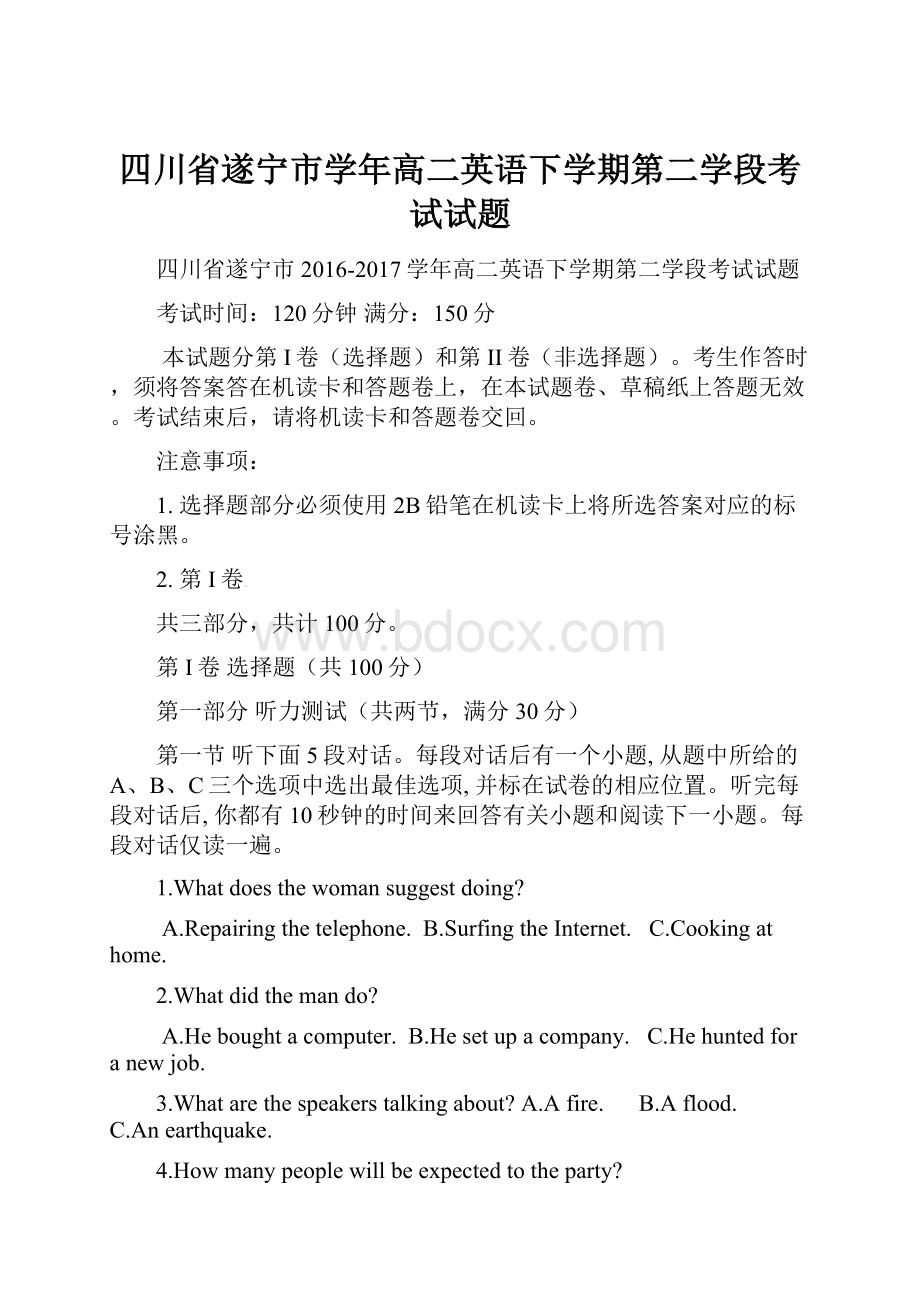四川省遂宁市学年高二英语下学期第二学段考试试题.docx
《四川省遂宁市学年高二英语下学期第二学段考试试题.docx》由会员分享,可在线阅读,更多相关《四川省遂宁市学年高二英语下学期第二学段考试试题.docx(19页珍藏版)》请在冰豆网上搜索。

四川省遂宁市学年高二英语下学期第二学段考试试题
四川省遂宁市2016-2017学年高二英语下学期第二学段考试试题
考试时间:
120分钟满分:
150分
本试题分第I卷(选择题)和第II卷(非选择题)。
考生作答时,须将答案答在机读卡和答题卷上,在本试题卷、草稿纸上答题无效。
考试结束后,请将机读卡和答题卷交回。
注意事项:
1.选择题部分必须使用2B铅笔在机读卡上将所选答案对应的标号涂黑。
2.第I卷
共三部分,共计100分。
第I卷选择题(共100分)
第一部分听力测试(共两节,满分30分)
第一节听下面5段对话。
每段对话后有一个小题,从题中所给的A、B、C三个选项中选出最佳选项,并标在试卷的相应位置。
听完每段对话后,你都有10秒钟的时间来回答有关小题和阅读下一小题。
每段对话仅读一遍。
1.Whatdoesthewomansuggestdoing?
A.Repairingthetelephone.B.SurfingtheInternet.C.Cookingathome.
2.Whatdidthemando?
A.Heboughtacomputer.B.Hesetupacompany.C.Hehuntedforanewjob.
3.Whatarethespeakerstalkingabout?
A.Afire.B.Aflood.C.Anearthquake.
4.Howmanypeoplewillbeexpectedtotheparty?
A.15.B.135.C.150.
5.Whydoesthewomanmentionherdinnerguests?
A.Toaskthemantojointhem.
B.Tosuggestpolitelythemanleave.
C.Toinvitethemantohaveanotherdrink.
第二节听下面5段对话或独白。
每段对话或独白后有几个小题,从题中所给的A、B、C三个选项中选出最佳选项,并标在试卷的相应位置。
听每段对话或独白前,你将有时间阅读各个小题,每小题5秒钟;听完后,各小题将给出5秒钟的作答时间。
每段对话或独白读两遍。
听下面一段对话,回答第6和第7两个小题。
6.HowmuchwillthemanpayfortheCDplayer?
A.$30.B.$70.C.$100.
7.Whatisthemanconcernedabout?
A.Returnpolicy.B.After-salerepairing.C.Exchangeofgoods.
听下面一段对话,回答第8和第9两个小题。
8.Whatkindofroomdoesthemantake?
A.Asharedroomwithanotherstudent.
B.Asingleroomwithhisownbathroom.
C.Hisownroomwithasharedbathroom.
9.Whatisexcludedintheconferencefee?
A.Meals.B.Tea.C.Coffee.
听下面一段对话,回答第10至第12三个小题。
10.Wheredoesthemanprobablywork?
A.Inahotel.B.Inachurch.C.Inafilmcompany.
11.Howdidthemanhelpthefilmstar?
A.Hewokehimup.
B.Helenthimhispants.
C.Hesenthimbacktotheroom.
12.Whatdoestheman'swifethinkofhim?
A.Heisofgreathelpathome.
B.Heisofnohelpwiththehousework.
C.Heisbusywithhisworkallthetime.
听下面一段对话,回答第13至第16四个小题。
13.WhoisAnna?
A.Theman'ssister.B.Theman'smother.C.Theman'sgrandmother.
14.Howlongwillthemanstay?
A.Threedays.B.Fourdays.C.Fivedays.
15.Whatsurprisedthewoman?
A.Themanonlyeatsvegetablesnow.
B.Themanstillhasschoolworktodo.
C.Themanisstayingforsuchashorttime.
16.Whatcanwelearnfromtheconversation?
A.Annaisavegetarian.
B.Annalovestoeatturkey.
C.ThemanisdisappointedwithAnna.
听下面一段独白,回答第17至第20四个小题。
17.Whatisthepassagemainlyabout?
A.Theplanfortheday.
B.Thecoursesoftheschool.
C.Anintroductiontotheteachers.
18.Whatarethelistenersgoingtodoat10:
40?
A.Doatest.B.Takearest.C.Gettheirbooks.
19.WhowillintroducetheLearningCenter?
A.Carol.B.Steve.C.Anna.
20.WhenarethelistenersexpectedtotalkwithHelen?
A.Duringthelunchtime.
B.Intheconversationclass.
C.AfteratalkaboutLondon.
第二部分阅读理解(共两节,满分40分)
第一节(共15小题;每小题2分,满分30分)
阅读下列短文,从每题所给的四个选项(A、B、C和D)中,选出最佳选项,并在答题卡上将该选项涂黑。
A
BUSSERVICE
NewYorkCity—Brennan,NewJersey
(Triptime:
30minuteseachway)
Timetable
●BusesleavetheRailwayStation,NewYork7:
00a.m.andeveryhalf-hourthereafter(此后)until11:
30p.m.(7daysaweek).
●BusesleaveBrennanStation20minutesbeforeandaftereveryhourfrom6:
20a.m.to10:
40p.m.(7daysaweek).
●Eveningrushhours(5:
00p.m.to7:
00p.m.)busesleavetheRailwayStation,NewYorkevery15minutes(Monday—Friday).
●Holidays:
busesleaveeveryhouronthehourtime,eachdirection.
AllticketsmustbeboughtatWindow12,theRailwayStation,NewYork,orattheBrennanStationWindowbeforeboardingbuses.
21.WhattimedoesabusleaveNewYorkforBrennaneveryThursday?
A.10:
20a.m.B.6:
30a.m.C.6:
45p.m.D.4:
40p.m.
22.WhichisthelatestbusyoushouldtakefromBrennanifyouhavetoarriveattheRailwayStation,NewYorkbefore4:
00p.m.onMonday?
A.The3:
20p.mbusB.the3:
00p.mbus
C.The3:
30p.mbusD.The3:
40p.mbus
23.WhattimedoesabusleaveBrennanforNewYorkonChristmasDay?
A.1:
00p.m
B.9:
40a.mC.3:
15p.mD.8:
30a.m
B
Theofficehasalwaysbeenaplacetogetahead.Unfortunately,Itisalsoaplacewherealotofnaturalresourcesstarttofallbehind.Takealookaroundnexttimeyou’reatwork.Seehowmanylightsareleftonwhenpeopleleave.Seehowmuchpaperisbeingwasted.Howmuchelectricityisbeingusedtoruncomputersthatarelefton.Lookathowmuchwaterisbeingwastedintherest-rooms.Andhowmuchsolidwasteisbeingthrownoutintherubbishcans.Webetit’salot.
Now,herearesomesimplewaysyoucanproducelesswasteatwork.Whenyouareatthecopier,onlymakethecopiesyouneed.Usebothsidesofthepaperwhenwritingsomethinglessimportant.Turnoffyourlightswhenyouleave.Usealowerwattbulbinyourlamp.Drinkyourcoffeeorteaoutofyourmugsi
nsteadofsingle-usecups.Setuparecyclingboxforcansandoneforbottles.Andwhenyou’reinthebathroombrushingyourteethorwashingyourface,don’tletthetaprun.Remember,ifweusefewerresourcestoday,we’llsavemorefortomorrow.
24.Themainpurposeofthepassageistotellpeople_______.
A.thedisadvantagesofworkinginanoffice
B.thewasteproducedinanoffice
C.tosaveresourceswhenworkinginanoffice
D.howtosavewaterinarestroom
25.Fromthepassagewecaninferthatintheoffice________.
A.usingcomputersisawasteofresource
B.manypeopledon’tturnoffthecomputersafterusingthemC.computersaretomakeelectricity
D.acomputerisnotamustforworking
26.Itissuggestedthatweusebothsidesofthepaperatthecopierbecause_______.
A.weareshortofpaperB.theprintingisnotimportant
C.weshouldsavepaperD.wehavetopayforthepaper
27.Theunderlinedwordmugsismostlikelytobe_______.
A.amachinethatmakescoffee
B.acontainerthatcanbeusedagainandagain
C.apaperproductfortea
D.somethingthatcanonlybefoundinanoffice
C
Moneyisstressful.Fortheseventhyearinarow,theAPA’sannualStressinAmericasurveyfoundthatmoneyisthetopsourceofstressforAmericanadults.MorethanaquarterofAmericanssaytheyfeelstressedaboutmoneymostorallofthetime.Only30percentratetheirfinancialsecurityashigh,andmorethantwo-thirdsbelievethatmoremoneywouldmakethemhappier.Peoplecommonlydealwithanxietybyavoidingwhateveritisthatmakesthemanxious.Unfortunately,ifyouavoiddealingwithyourfinances,you’lllikelycreatemorefinancialproblems,andmoreanxiety,inthelongterm.
Moneymattersaretooimportanttoignore.Financialinabilityislinkedtomoneymismanagementandtodebt.Debt,inturn,isassociatedwithlowerself-confidence,lowerproductivityandgreaterstress.Unsurprisingly,researchhasalsolinkedfinancialpressuretodesperation(绝望).
Wedevelopourbeliefsandattitudesaboutmoneyearlyinlife.Often,wearen’tevenconsciouslyawareofwhatourbeliefsare,letalonewherewelearnedthem.Ifyou’redealingwithfinancialavoidanceorfinancialrejection,itcanhelptothinkcriticallyaboutthemoneybeliefsyoulearnedinchildhood.Thinkaboutwhatyourparentstaughtyouaboutmoney.Talktofamilymembersabouttheirmoneybeliefs.Thentrytochallengeyourexistingbeliefsaboutmoney.
Manypeoplefeelembarrassedaboutthe
irdebt,ashamedthattheyletbankstatementspileupunread.Butthatshamekeepsyoustuck.Trytomovepasttheself-blamesoyoucantakesomeconcretestepstowardfinancialhealth.
28.WhatdowelearnaboutAmericanadultsfromthetext?
A.Moneycausesthemthemainstress.
B.Theycareaboutmoneymost.
C.Theyneedm
oneyverymuch.
D.Theirfinancialsecurityishigh.
29.Whatdoestheauthorthinkofavoidingfinancialstress?
A.It’sunderstandable.B.It’sharmful.
C.It’shelpful.D.It’suseless.
30.Accordingtothetext,ourmoneybeliefsaredevelopedfrom.
A.examplesoffamilymembersB.attitudesofneighborhood
C.experiencesofchildhoodD.influencesofparents
31.Whatcanpeopledotogetfinancialhealthaccordingtotheauthor?
A.Repaytheirdebt.B.Readtheirbankstatements.
C.Overcometheirself-blame.D.Challengeexistingmoneybeliefs.
D
Technologicalchangeiseverywhereandaffectseveryaspectoflife,mostlyforthebetter.However,socialchangesbroughtaboutbynewtechnologyareoftenmistakenforachangeinattitudes.
Anexampleathandistheinvolvementofparentsinthelivesoftheirchildrenwhoareattendingcollege.Surveys(调查)onthistopicsuggeststhatparentstodaycontinuetobe“very”or“somewhat”overly-protectiveevenaftertheirchildrenmoveintocollegedormitories.Thesamesurveysalsoindicatethattherateofparentalinvolvementisgreatertodaythanitwasagenerationago.Thisisusuallyinterpretedasasignthattoday’sparentsaretryingtomanagetheirchildren’slivespastthepointwherethisbehaviorisappropriate.
However,greaterparentalinvolvementdoesnotnecessarilyindicatethatparentsarefailingtoletgooftheir“adult”children.
Inthecontext(背景)ofthisdiscussion,itseemsvaluabletofirstfindoutthecauseofchangeinthecaseofparents’involvementwiththeirgrownchildren.Ifparentsofearliergenerationshadwantedtobeintouchwiththeircollege-agechildrenfrequently,wouldthishavebeenpossible?
Probablynot.Ontheotherhand,doesthepossibilityoffrequentcommunicationtodaymeanthattheurgetodosowasn’tpresenta
generationago?
Manystudiesshowthatolderparents—today’sgrandparents—wouldhavecalledtheirchildrenmoreoftenifthemeansandcostofdoingsohadnotbeenabarrier.
Furthermore,s